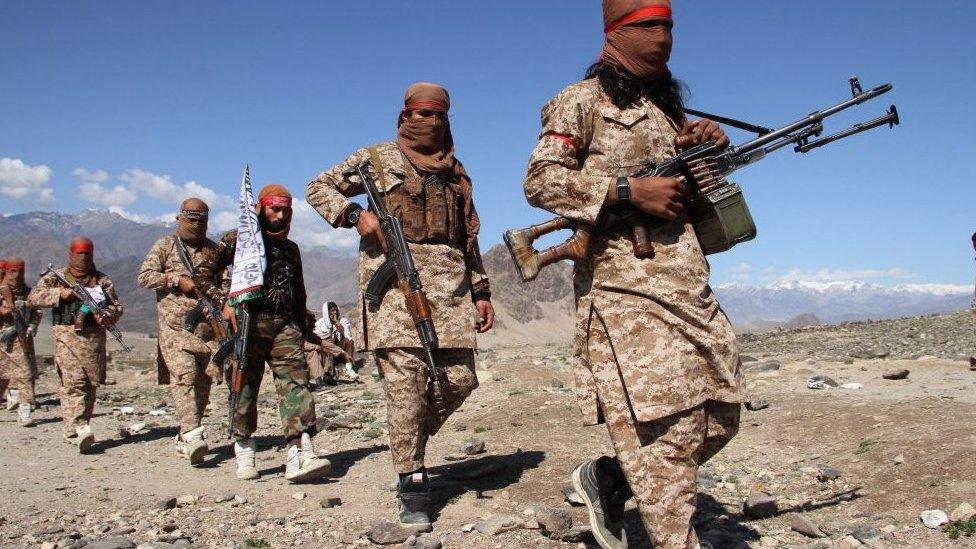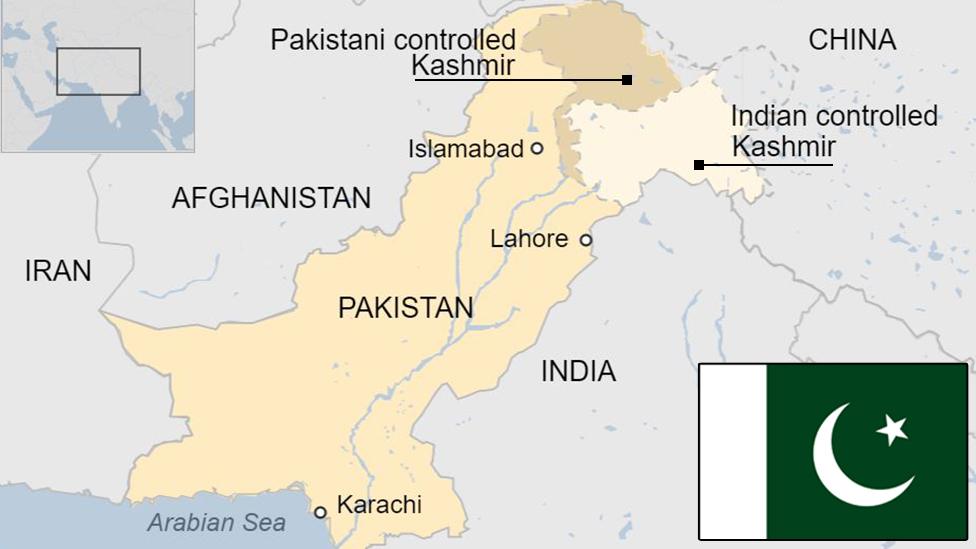Pakistan talks offer divides Taliban factions
- Published

Asmatullah Muawiya appears to believe a deal would bring him peace dividends
There are signs that an offer of talks by new Prime Minister Nawaz Sharif is causing rifts within the ranks of the Pakistani Taliban.
The Tehrik-e-Taliban Pakistan (TTP) is an umbrella organisation of militant groups fighting Pakistani forces and attacking targets in Pakistan.
A public declaration last week by a senior militant, Asmatullah Muawiya, welcomed Mr Sharif's offer.
It is was the latest in a series of initiatives focused on bringing militant attacks in Pakistan under control before the Nato withdrawal from Afghanistan in 2014.
It is unlikely however that these developments will lead to a decrease in militant activity in Afghanistan - several of the militant groups in Pakistan have long opposed attacking targets in the country, concentrating their activities on Afghanistan instead.
Mr Muawiya heads the Junood-e-Hafsa group of Taliban militants from Pakistan's Punjab province who are generally referred to as the Punjabi Taliban.

Pakistani security forces are frequently targeted by the Taliban
It is affiliated with the TTP, and was named by a TTP spokesman in June as having carried out the attack in which 10 foreign climbers were killed on Nanga Parbat in northern Pakistan.
On 22 August, reporters in the north-western city of Dera Ismail Khan received a statement signed by Mr Muawiya in which he praised Prime Minister Sharif's "political maturity" for offering peace talks to the militants.
But it seems that not all the TTP is as enthusiastic as he is.
In a carefully worded statement the next day, the TTP said that although Mr Muawiya "is respectable for us", he now has no formal relationship with the group and the leadership council would "soon" select a new head of its Punjab chapter.
In a terse rejoinder just hours afterwards, Mr Muawiya told the Associated Press that the TTP had "no capacity" to expel him because the Punjabi Taliban was a separate group with its own mechanism to decide on the leadership and other matters.
A former activist of the Jaish-e-Mohammad (JM) militant group, Mr Muawiya is believed by some to have links to al-Qaeda. He moved to Pakistan's north-western tribal region of Waziristan in 2007 and set up his own Junood-e-Hafsa (JH) group.

Many Taliban want to concentrate on Afghanistan once Nato withdraws in 2014
He has said that he did so because the JM leadership refused to train their guns on the Pakistani government after the "massacre" at Islamabad's Red Mosque in 2007, when more than 100 people - mostly militants but also several male and female students of a religious school - were killed in military action to evict dozens of heavily-armed militants.
In subsequent years, Mr Muawiya emerged as an important Punjabi Taliban leader having influence over several Punjabi groups such as the sectarian Lashkar-e-Jhangvi, and the militant group led by Qari Saifullah Akhtar - another suspected al-Qaeda sympathiser who is believed by police to have been involved in the 2008 bombing of the Marriott Hotel in Islamabad, external, killing more than 50 people.
Sources within Taliban ranks in their Waziristan stronghold say that Mr Muawiya's willingness to revoke his earlier call for jihad against Pakistan comes at a time when calls for peace within Pakistan are gathering momentum among the militant community.
Correspondents say the three main Taliban groups in the region - the Hafiz Gul-led Bahadur group, the group led by Mullah Nazir and the Haqqani network - all have some form of understanding with the Pakistani establishment and have opposed attacks on Pakistani territory - instead preferring to concentrate their efforts on Afghanistan.
A grand leadership council of all militant groups based in Waziristan, called the Shura-e-Maraqebat, also advocates peace with Islamabad.
The council is led by the Afghan Taliban groups, and has two members each from all those Pakistani groups that subscribe to the leadership of Mullah Mohammad Omar, the spiritual head of the Taliban movement in the region.

Militants led by Mr Muawiya are believed to have killed 10 foreign climbers in June
There are also elements within the TTP who favour a peace deal with Islamabad, such as the group led by the organisation's former deputy leader, Mufti Waliur Rahman.
Mr Rahman developed serious differences with TTP chief Hakimullah Mehsud over the issue, and is said to have been instrumental in ultimately persuading him to make a talks offer to Islamabad in December.
Mr Mehsud promptly revoked the offer when Mr Rahman was killed in a drone strike in May.
But sources among the Taliban say things are nevertheless changing in Waziristan because of two significant and recent developments.
Two back-to back all-party conferences held by the Awami National Party and the Islamist Jamiat Ulema-e-Islam-Fazl (JUI-F) party in December and January have created momentum for peace talks by engaging tribal elders.
Both conferences were attended by nearly all the major political parties and community elders from across the Pakistani tribal areas, including the Waziristan region.
Sources say the conferences have had an impact in highlighting the "futility" of war in Pakistan, and have galvanised support for peace in the tribal areas.
The second development relates to secret, indirect negotiations between representatives of the government and TTP leaders.
A prominent Taliban leader told the BBC on condition of anonymity that initial talks had been held on a range of issues, including the cessation of sectarian attacks in Pakistan, and the dissociation of the TTP from more radical groups such al-Qaeda and Lashkar-e-Jhangvi.
A senior Pakistani official also confirmed to the BBC that such talks were in progress.
Taliban officials say there is increasing pressure on anti-Pakistan groups to embrace a peace deal with Islamabad. This, they believe, will ensure the safety of their leaders and activists while simultaneously freeing them up for operations in Afghanistan once Nato troops withdraw.
In such an uncertain climate it is inevitable that turf wars should break out between different TTP factions - including that led by Mr Muawiya - as all try to secure their positions ahead of a possible deal.
But it is a risky strategy - one Taliban official has already accused him of laying down his cards prematurely.
No doubt lurking in the back of Mr Muawiya's mind is the fact that Pakistan is now ruled by the family of Nawaz Sharif - which like him has its power base in Punjab. He appears to be eager to be a major beneficiary from any peace deal.
But will the isolation of anti-Pakistan groups within the TTP ensure sustained peace in Pakistan?
The Pakistani strategy still seems to be to separate the "bad" Taliban from those who can be tolerated, or even covertly supported. This policy has not worked during the last 10 years and it is not certain whether it will now.
- Published12 August 2022

- Published15 March 2024
